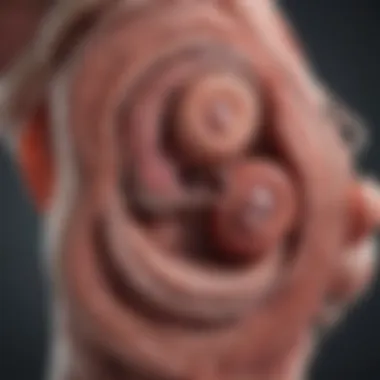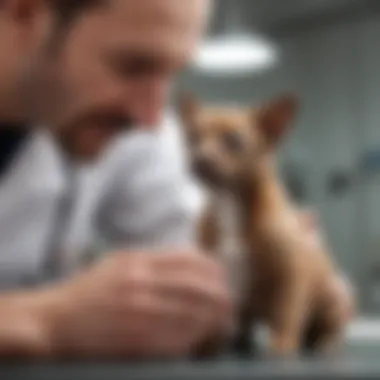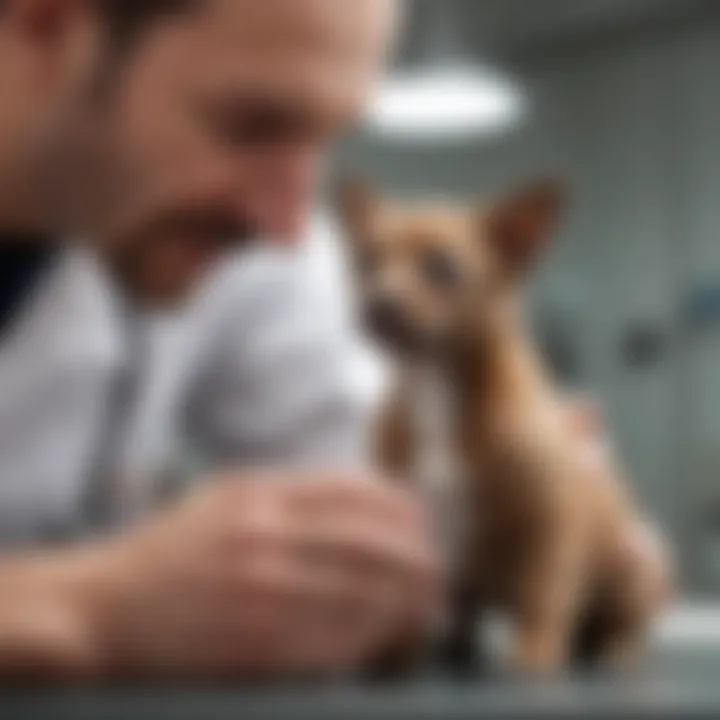Understanding Bowel Blockage: Symptoms and Insights


Intro
Bowel blockage, or intestinal obstruction, is a critical condition that can pose significant health risks to pets. As pet owners, understanding the symptoms, causes, and potential treatments for this issue is paramount. Early recognition can be crucial in preventing severe complications. In this article, we explore how to identify signs of blockage, what factors contribute to this condition, and the available treatment options.
Understanding Your Pet
Breed Traits
Different breeds may have varying predispositions to bowel blockage. For instance, brachycephalic breeds like Bulldogs and Pugs may experience more respiratory challenges, which can indirectly affect their digestive systems. Larger breeds such as Great Danes are susceptible to conditions like bloat that can lead to obstruction. Conversely, some small breeds may be more prone to ingesting foreign objects, potentially causing blockages. Understanding these traits can help in monitoring your pet for early signs of distress.
Common Temperaments
Temperament plays a role in a pet's behaviors that can lead to bowel issues. Pets that are particularly curious or prone to chewing on non-food items may be more at risk for blockages. For example, puppies or young dogs may exhibit playful behavior that could result in eating inappropriate items, so owners need to supervise their activities closely.
Special Needs
Certain pets may have special needs that require additional attention to their digestive health. Older pets may have slower digestive systems, making them more susceptible to various gastrointestinal issues. Additionally, pets with existing health problems such as kidney disease or diabetes might require specific dietary considerations to support digestive function.
Pet Care Essentials
Nutrition and Feeding Guidelines
Proper nutrition is essential to maintaining your pet's digestive health. High-quality kibble or balanced homemade diets can help to minimize issues. It is advisable to feed your pet regular meals, rather than leaving food out all day. This can reduce the chances of overeating and potential blockages. Aim for a diet rich in fiber and ensure that the components of the food are appropriate for your pet's size and age.
Grooming Tips and Techniques
Regular grooming can also assist in digestive health. For instance, brushing your pet's coat can reduce shedding and the ingestion of hair, particularly in cats. Keeping your pet clean around the anal area can also prevent issues with fecal matter buildup, which can lead to blockage.
Health and Wellness
Routine veterinary check-ups are vital. During these visits, veterinarians can check for signs of underlying health issues that could predispose your pet to bowel problems. Vaccination against certain diseases can also help keep your pet healthy. Pay attention to your pet's normal behavior and any changes in their eating or elimination habits.
Training and Behavior
Basic Training Techniques
Training your pet can influence their eating habits. For example, teaching
Prelude to Bowel Blockage
Bowel blockage is a serious condition that can affect various groups of pets. Understanding the physiological and behavioral changes that accompany this issue is crucial for any pet owner. The importance of recognizing the symptoms of bowel blockage is paramount to enabling early interventions. By catching the symptoms early, pet owners can prevent serious health complications that arise when the blockage is not treated promptly.
Definition of Bowel Blockage
Bowel blockage, or intestinal obstruction, refers to a hindrance in the passage of contents through the gastrointestinal tract. This blockage can occur at various points along the digestive system and can be caused by various factors. For instance, physical obstructions like foreign objects, tumors, or even twisting of the intestines can lead to this condition. When the bowel is blocked, it disrupts the normal digesting and absorption of nutrients, which can have dire health consequences for pets.
Importance of Recognizing Symptoms
Recognizing the symptoms of bowel blockage is critical. Symptoms often include severe abdominal pain, vomiting, and changes in bowel habits. If these signs are overlooked, the result can be not only discomfort for the pet but also life-threatening situations. Early recognition often leads to more effective treatment options. Therefore, being knowledgeable about these symptoms allows pet owners to respond quickly.
Common Symptoms of Bowel Blockage
Recognizing the common symptoms of bowel blockage is crucial for pet owners. Early detection allows for timely intervention, which can significantly affect the outcome. Understanding these symptoms can also help differentiate between minor digestive issues and more serious conditions requiring urgent veterinary attention. In this section, we will explore several notable symptoms that may indicate bowel blockage in pets.
Abdominal Pain and Discomfort
Abdominal pain is often one of the first signs that a pet may be experiencing a bowel blockage. Pets might exhibit discomfort through various behaviors such as whining, pacing, or refusing to move. Abdominal pain can manifest in different ways, and it is not always easy for a pet owner to determine the severity.
If your pet exhibits signs of excessive pain or seems unusually sensitive when their abdomen is touched, this could be a red flag. It is essential to monitor their behavior closely, as unresolved pain might lead to more severe complications. You can consider keeping a diary of your pet's behaviors and symptoms to provide valuable information to your veterinarian.


Vomiting and Nausea
Vomiting is another common symptom associated with bowel blockage. Pets may vomit frequently or only in specific instances. This can lead to dehydration and serious health risks if not addressed promptly. Nausea can be detected when a pet shows disinterest in food or drink, along with restless behavior.
If your pet vomits repeatedly, you should consult a veterinarian as soon as possible. Additionally, observe any changes in the vomit’s color or texture, as these details can aid in diagnosis. Taking action quickly can prevent further complications.
Changes in Appetite
Changes in appetite are important indicators of digestive issues. A pet that suddenly refuses food or water, or eats significantly less than usual, may be suffering from a bowel blockage. In contrast, some pets may exhibit an abnormal increase in hunger but still have weight loss, indicating the body’s inability to absorb nutrients properly.
It is essential to assess your pet's eating habits regularly. Keep a record of any significant changes and report them to your veterinarian during your next visit. Ensuring that your pet maintains a balanced diet is vital for their overall health.
Diarrhea or Constipation
Diarrhea or constipation can indicate different problems, including bowel blockage. While diarrhea might suggest a less severe problem, constipation could signify a more severe issue blocking normal bowel movement. Observing the frequency and consistency of your pet’s stools can provide insights into their digestive health.
If your pet alternates between diarrhea and constipation, it is crucial to reach out to your vet. Understanding how long these symptoms persist will help determine whether there is a need for immediate medical intervention.
Bloating and Distention
Bloating and abdominal distention are prominent signs of possible bowel blockage. You may notice that your pet's abdomen appears swollen or feels tense to the touch. This could indicate trapped gas and materials in the digestive tract, leading to discomfort and potential complications.
Monitor your pet closely; if you observe significant bloating, avoid offering food until you consult your veterinarian. Bloating doesn't resolve on its own and can escalate quickly, leading to severe consequences.
Takeaway: It is essential to remain vigilant concerning any combination of these symptoms. Being proactive is the best way to safeguard your pet's health and well-being.
Types of Bowel Blockage
Understanding the types of bowel blockage is crucial for pet owners and animal enthusiasts alike. Different forms of blockage can lead to various health issues for pets. Knowledge of these types ensures that owners can more effectively recognize potential problems and seek appropriate veterinary care. This segment will delve into two primary categories: mechanical blockage and functional blockage. Both types can have serious implications for the health of your pet, making it essential to differentiate between them.
Mechanical Blockage
Mechanical blockage occurs when there are physical obstructions in the bowel that impede the normal passage of digested food, fluids, or gas. Common causes of mechanical blockage include:
- Foreign Objects: Pets, especially dogs, often chew and swallow items that should not be ingested, such as toys, bones, or clothing. These objects can get stuck in the digestive tract, causing a blockage.
- Tumors or Growths: Abnormal growths, whether benign or malignant, can create physical barriers within the bowel, preventing the movement of contents.
- Adhesions: Scar tissue from previous surgeries can develop and create bands of tissue that bind to the bowel and cause blockages.
Symptoms of mechanical blockage often include severe abdominal pain, vomiting, and inability to pass stools. If not addressed promptly, this type of blockage can lead to serious complications, including perforation of the bowel.
Functional Blockage
Functional blockage, also known as ileus, differs from mechanical blockage in that there is no physical obstruction present. Instead, this type involves a disruption in the normal muscular contractions of the bowel that facilitate digestion. Causes of functional blockage may include:
- Medications: Certain drugs can adversely affect bowel motility, leading to a stall in the digestive process.
- Inflammatory Diseases: Conditions like pancreatitis or inflammatory bowel disease can impair proper digestive function, resulting in functional blockage.
- Metabolic Disorders: Some metabolic issues can impact how the digestive system operates, preventing normal function.
While functional blockage may not present the same immediate physical issues as mechanical blockage, it still warrants concern. Symptoms might be less severe but can include mild to moderate abdominal discomfort, bloating, and intermittent vomiting. In these cases, early diagnosis and treatment can prevent more serious health problems for your pet.
Understanding the type of blockage is key to determining the correct management approach and timely intervention. Recognizing these distinctions enables informed conversations with veterinarians and better overall care for pets.
In summary, both mechanical and functional blockages can threaten your pet's health. Knowledge of these types allows pet owners to be vigilant in observing symptoms and seeking timely veterinary assistance. This proactive approach ensures healthier, happier pets.
Causes of Bowel Blockage
Understanding the causes of bowel blockage is essential for recognizing, preventing, and treating this condition effectively. Awareness of these elements can lead to timely intervention, reducing the risk of serious complications. Blockage can arise due to various factors, ranging from simple ingestion of foreign objects to complex growths. Knowing the underlying reasons helps in identifying symptoms and seeking veterinary care promptly.
Foreign Objects and Ingestion Issues
One common cause of bowel blockage is the ingestion of foreign objects. Pets, especially dogs and cats, have a tendency to chew and swallow objects that do not belong to their diet. This can include toys, strings, or even parts of clothing. When these items cannot pass through the digestive tract, they can create a blockage.
Symptoms may include lethargy, vomiting, and changes in bowel movements. It is critical to monitor your pet closely. If you suspect they have eaten something they shouldn't, prompt veterinary action is crucial. The veterinarian may perform imaging studies to check for obstructions.


Tumors and Growths
Tumors and abnormal growths can also lead to bowel obstruction. These may be benign or malignant. As tumors develop within or near the intestines, they can compress or invade the intestinal walls. This pressure can impede the normal movement of food through the digestive system.
Regular veterinary check-ups can help in early detection. Symptoms can be similar to other causes of blockage, such as vomiting and weight loss. Tumors may require surgical removal or other treatments. Understanding this cause highlights the need for vigilance in observing any changes in your pet’s health.
Inflammatory Conditions
Inflammatory conditions, such as inflammatory bowel disease, can also result in blockage. In these cases, the intestinal lining may become swollen and thickened, leading to narrowed passages in the gut. This can drastically reduce the normal flow of food and waste.
Persistent vomiting, diarrhea, and loss of appetite are notable signs of this issue. Your veterinarian may recommend specific diets or medications to manage inflammation and restore normal function. By being aware of such conditions, pet owners can take proactive measures in dietary and health management.
Post-surgical Complications
Post-surgical complications can lead to bowel obstruction as well. Surgeries involving the stomach or intestines may result in scar tissue formation or adhesions, which can disrupt the normal passage of food. This complication emphasizes the importance of following your veterinarian’s post-operative care guidelines carefully.
Signs may include abdominal discomfort, vomiting, or changes in bowel habits. Quick identification and treatment of these symptoms can prevent severe complications. Discussing possible post-surgical risks with your veterinarian is key during the pre-surgery consultation.
"Understanding the causes of bowel blockage is vital for every pet owner, as it enables informed decisions regarding your pet's health."
Diagnosis of Bowel Blockage
Diagnosis of bowel blockage is a crucial aspect of addressing this serious condition. Identifying bowel blockage promptly can significantly affect the outcome and overall health of the pet. The process involves a combination of clinical examination, imaging techniques, and laboratory tests, each contributing unique insights into the underlying issue.
Medical professionals rely on specific elements in the diagnosis to offer targeted treatment. Immediate recognition of symptoms, accompanied by accurate diagnostic tools, allows for a more efficient approach to managing this potentially life-threatening condition. Moreover, it can prevent further complications, which can arise from delayed diagnosis.
Clinical Examination
The clinical examination is the first step in diagnosing bowel blockage. During this assessment, the veterinarian looks for physical signs and evaluates the pet's overall health. They typically check for abdominal tenderness, distention, and the presence of abnormal sounds during palpation. Understanding these indicators is essential, as they can provide immediate insights into the potential severity of the blockage. Furthermore, a thorough history of the pet's eating habits and changes in behavior can reveal significant clues that guide the diagnostic process.
Imaging Techniques
Imaging techniques play a vital role in the diagnosis of bowel blockage. They offer a visual representation of the internal structures and help in identifying the location and type of blockage. The three main imaging methods include X-rays, ultrasound, and CT scans. Each method has its advantages and disadvantages, which are crucial to consider.
X-rays
X-rays are a fundamental imaging tool in the diagnosis of bowel blockage. They are commonly used due to their speed and efficiency in providing initial information. One key characteristic of X-rays is their ability to reveal the presence of gas patterns and abnormal fluid levels in the gastrointestinal tract. This can suggest the location of a blockage. However, their limitations exist, as X-rays may not always show smaller obstructions or specific types of issues related to the bowel.
Ultrasound
Ultrasound is another significant imaging technique frequently employed in diagnosing bowel blockage. The key characteristic of ultrasound is its capability to provide real-time images of soft tissues and fluid-filled spaces. This non-invasive option allows veterinarians to observe the bowel's movements and assess any abnormal growths or obstructions. However, its effectiveness can be limited in animals with significant obesity or excessive gas that interferes with sound waves.
CT Scans
CT scans offer a more detailed and comprehensive view of the abdominal area, which is beneficial in diagnosing bowel blockage. They provide high-resolution images and can identify smaller abnormalities that other methods may miss. The key characteristic of CT scans is their ability to provide cross-sectional views and multiple angles of the internal structures, making them a preferred choice in complex cases. However, the disadvantages include the need for sedation in some animals and the higher costs associated with the procedure.
Laboratory Tests
Laboratory tests serve as a complementary approach to imaging techniques in diagnosing bowel blockage. Blood tests can help assess the overall health of the pet, indicating dehydration or infection. Fecal analysis may also provide insights into what is happening in the digestive system. This combination of diagnostics enhances the understanding of bowel blockage and facilitates more informed treatment decisions.
Management and Treatment Options
Management and treatment of bowel blockage are crucial steps in ensuring not only the health of pets but also their quality of life. Identifying the right options depends on the severity of the blockage, its underlying causes, and the overall health of the animal. Understanding these options allows pet owners to make informed decisions that can have lasting effects on their pet's well-being.
Conservative Management
Conservative management often serves as the first line of action in less severe cases of bowel blockage. This approach typically involves non-invasive treatments and careful monitoring. In many instances, minimal intervention can resolve the issue without the need for surgery.
Key elements of conservative management may include:


- Dietary adjustments: Offering easily digestible foods can help avoid further irritation to the digestive tract.
- Fluid therapy: Ensuring proper hydration is essential for helping the bowel to function normally. In some cases, fluids are administered intravenously.
- Medications: Vets may prescribe medications to relieve pain, reduce inflammation, or stimulate bowel movements.
- Observation: Close monitoring allows for timely response should symptoms worsen.
The benefits of conservative management include reduced stress for the pet, lower costs, and the avoidance of surgical risks. Yet, it requires a vigilant approach, as not all blockages will resolve without surgical intervention.
Surgical Intervention
In cases where conservative management fails or in instances of severe blockage, surgical intervention may become necessary. This typically involves a surgical procedure to remove any obstruction or damaged sections of the bowel. The goal of surgery is to restore normal gastrointestinal function and prevent further complications.
Elements involved in surgical intervention include:
- Diagnosis confirmation: Imaging techniques like X-rays or CT scans help identify the exact nature of the blockage, allowing for precise surgical planning.
- Anesthetic considerations: Pets require anesthesia for the surgery, which adds a layer of risk.
- Recovery time: Post-surgery, pets may need several days to weeks to fully recover, which is essential for healing.
While surgery is often seen as a last resort, its benefits often outweigh the risks in cases of severe or prolonged bowel blockage. Successful surgical intervention can lead to significant improvement in a pet’s health and comfort.
Post-treatment Care
After the management of a bowel blockage, whether conservative or surgical, post-treatment care plays an essential role in recovery. Proper care can help prevent complications and support the healing process.
Important aspects of post-treatment care include:
- Monitoring: Closely observe the pet for any symptoms that reoccur, such as vomiting, pain, or changes in appetite.
- Dietary adjustments: Gradual reintroduction to their regular diet is important. During recovery, a soft diet may be recommended.
- Follow-up veterinary visits: Regular check-ups assist in tracking the recovery process and modifying care plans as needed.
- Medications: Administer prescriptions as directed to manage pain or prevent infection.
Effective post-treatment care requires cooperation between pet owners and veterinarians to ensure the best outcomes for the pet's health. Proper follow-up can avert complications and enhance recovery chances.
Understanding management and treatment options for bowel blockage equips pet owners with essential knowledge to navigate this challenging condition. Quick and informed action can lead to a better outcome for pets, making awareness of these aspects invaluable.
Prevention of Bowel Blockage
Bowel blockage can lead to severe health issues for pets. By focusing on prevention, owners can significantly reduce the risk of their pets experiencing this condition. Understanding how to avert bowel blockage is essential for maintaining a pet's digestive health. Preventative measures can save pets from pain and the necessity of invasive medical treatments.
Dietary Considerations
Diet plays a crucial role in preventing bowel blockage. A balanced diet ensures that pets receive the necessary nutrients while promoting healthy digestion. High-fiber foods help maintain regular bowel movements, reducing the risk of constipation that can lead to blockage.
Some dietary considerations include:
- Quality Protein Sources: Include animal-based proteins like chicken or fish. These are easier for pets to digest compared to fillers or low-quality ingredients.
- Fiber-rich Foods: Incorporate vegetables like pumpkin or carrots. These can enhance stool bulk and assist with regularity.
- Hydration: Ensure that pets have constant access to fresh water. Proper hydration aids in digestion and reduces the risk of hard stools.
Monitoring your pet's diet is essential. Changing food too quickly can upset a pet's stomach. Introduce any new diet gradually to avoid digestive distress.
Regular Veterinary Check-Ups
Routine veterinary check-ups are vital for the prevention of bowel blockage. A veterinarian can detect underlying issues before they escalate. During these visits, the vet can evaluate your pet’s overall health and discuss any dietary adjustments needed.
Regular check-ups may include:
- Physical Examinations: Assessing weight, hydration status, and abdominal health.
- Preventive Vaccinations: Keeping pets protected against illnesses that can indirectly contribute to digestive problems.
- Diagnostic Tests: If there are concerns, the vet may recommend tests like blood work or imaging to check for early signs of obstruction.
Closure
Bowel blockage is a serious health issue that can affect pets in various ways. Understanding the symptoms and knowing how to react can save lives. This article provided insights into the key symptoms associated with bowel blockage, detailing how they can manifest and escalate without attention. Recognizing signs like abdominal pain, vomiting, and changes in appetite is vital for timely intervention.
Recap of Key Symptoms
In summary, here are the key symptoms to watch for in your pets:
- Abdominal pain and discomfort: This may feel like an acute or dull ache. Pets may exhibit signs like whining or excessive grooming of their abdomen.
- Vomiting and nausea: Unexplained vomiting, especially frequent occurrences, can indicate a blockage.
- Changes in appetite: Reduced eating or drinking can signal underlying issues.
- Diarrhea or constipation: Both can occur depending on the nature of the blockage.
- Bloating and distention: A noticeable swelling of the abdomen is a significant warning sign.
These symptoms should not be ignored. Observing a combination of these signs can be indicative of a blockage. Early detection often leads to better outcomes in treatment.
The Importance of Prompt Action
Prompt action is crucial when dealing with signs of bowel blockage. Delaying veterinary care can result in serious complications, including perforation of the intestines or infection. If any symptoms are noted, minimize the risk by seeking immediate professional advice. Timely intervention can make a significant difference in your pet's recovery and overall health.
Taking swift action can mean the difference between life and death for your pet. Do not hesitate to consult a veterinarian if bowel blockage is suspected.



